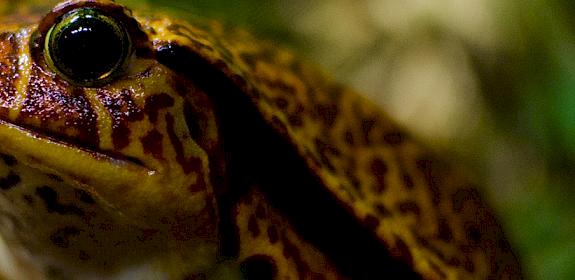Wildlife crime makes debut at International Anti-Corruption Conference
Panama City, Panama, December 2016—In a major boost to global efforts to fight wildlife crime, a consortium of 11 organizations shone a light on illicit financial flows and corruption during the 17th International Anti-Corruption Conference (IACC) in Panama (1st-4st December 2016)—identifying a series of steps to help tackle the scourge.
The unprecedented workshop was the first time that illicit financial flows and corruption in wildlife crime, including fisheries, had been part of the official agenda of an IACC. Entitled Shared planet, shared responsibility: creating multi-stakeholder alliances to combat wildlife, forest and fisheries crime, the event was a collaborative initiative, involving 11 partners including TRAFFIC and co-ordinated by WWF under the auspices of the 3C Network for Countering Conservation-related Corruption.
Moderated by Juan Carlos Navarro, the former Mayor of Panama City, and Nicole Botha, Senior Advisor on Anticorruption and Integrity with GIZ, the session discussed how corruption occurs at every stage of living natural resource value chains and looked at the role of both grand and petty corruption in enabling wildlife, forest and fisheries crime.
Funded by the Deutsche Gesellschaft für Internationale Zusammenarbeit (GIZ), USAID through the Wildlife, Trafficking, Response, Assessment and Priority Setting Project (Wildlife TRAPS) implemented by TRAFFIC, Transparency International and WWF, the workshop provided a platform for a participatory approach from the conservation, financial and anti-corruption communities to deepen understanding of corruption, links to illicit flows and entry points to tackle it.
Critically, it highlighted how illicit financial flows associated with wildlife crime exacerbate poverty and economic disparities, and undermine resource management plans and legal trade regimes, threatening food security and the economic, environmental and social pillars of sustainable development.
This meeting highlights the growing international recognition that wildlife crime is not simply an environmental matter—it carries with it all the trappings of serious, organized crime and needs to be dealt with accordingly
Nick Ahlers, TRAFFIC’s Wildlife TRAPS Project Leader.
“Political corruption and systemic governmental corruption are pervasive facilitators of wildlife and fisheries crime, providing the enabling environment for supply chain corruption,” said Robert Barrington, CEO, Transparency International - UK.
“This workshop provided the platform for diverse experts from the conservation, financial, anti-corruption and judicial sectors to come together and demonstrate that there is a common language and a shared goal – only by working together can we make real headway”, said Rob Parry-Jones, WWF Global Policy Lead, Wildlife Crime Initiative.
Indeed, greater collaboration was the key recommendation of the workshop and its high level panel, including Mrs Dorcas Agik Oduor, Kenya’s Deputy Director Public Prosecutions, Tom Keatinge, Director of the Centre for Financial Crime and Security Studies at the Royal United Services Institute for Defence and Security Studies, Dr Gail Lugten, an expert in international fisheries law from the University of Tasmania, James Swenson, Head of Financial Crime and Reputational Risk Managed Services at Thomson Reuters, Candice Welsch of UNODC, and Sebastian Wegner from the Fisheries Transparency Initiative.
The workshop outcomes recommended that anti-corruption, financial and conservation communities must join forces to deepen understanding of what types of corruption occur where and how, and the links between wildlife crime, illicit financial flows and associated financial crime. The conservation community could contribute to efforts in the private sector, including financial institutions, to address wildlife crime through development of due diligence procedures ensuring supply chain integrity, and in development of guidelines for the financial sector to link financial crime to wildlife crime, including prioritising financial analysis associated with wildlife crime.
Also raised was the question of an International Convention compelling countries to lift the corporate veil over beneficial ownership, thereby making it harder for criminal and corrupt behaviour to evade international legal obligations pertaining to human rights and environmental crimes. Further outcomes of the workshop included calls for strategies to prevent corruption to be included in the hiring, training and management of staff, including the protection of whistle blowers; the establishment of cross-sectoral interagency task forces to address wildlife crime so that laws concerning tax evasion, fraud and money laundering could be brought to bear on actors engaged in wildlife crime; and credible, public transparency in the issuance of official documentation concerning the exploitation of natural living resources.




